What happens when you're in the middle of making your favorite salad dressing and realize you've run out of olive oil? You could pick up some more on your way home from work, but who has time for that? If you can't leave the house to pick up more, don't worry—there are plenty of substitutes out there!
We've put together a list of the best olive oil substitutes in this article, whether you're cooking or baking. I've also linked where you can buy them under each option! Experiment with different substitutes to see which ones you like best!
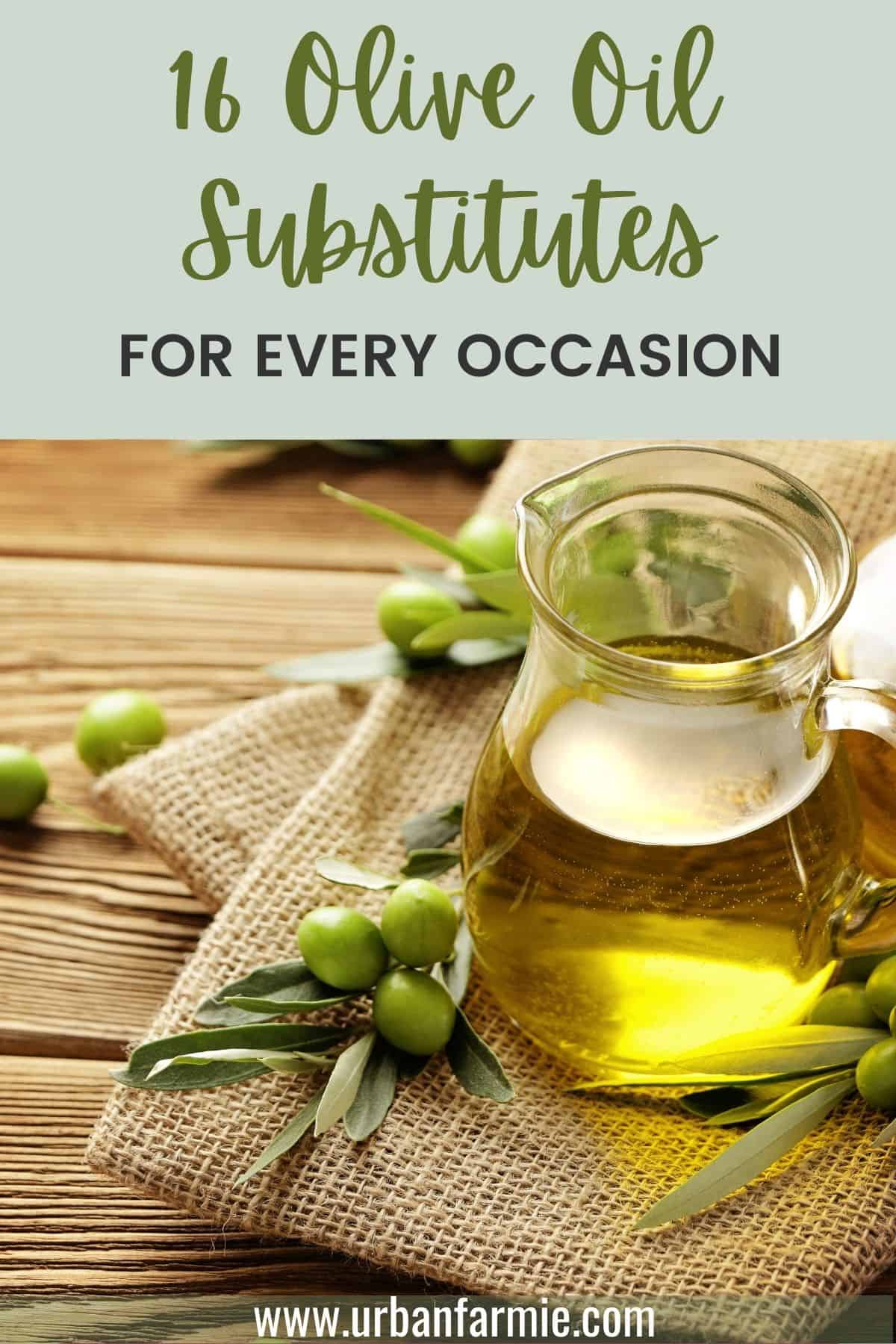
This post contains helpful tips and tricks! If you're in a rush, please use the Table of Contents below!
This post might contain affiliate links. If you click on those and make a purchase, I earn a small commission at no extra cost to you. As an Amazon Associate I earn from qualifying purchases.
Benefits and uses of olive oil
Olive oil is an incredibly versatile cooking ingredient because it's healthy, has minimal processing, and has a neutral flavor. It can be used for everything from salad dressing to sautéing to baking. For instance, it's a key ingredient in enhancing flavors in a delicious Caprese salad, or make a delectable muffin (like this pistachio muffin).
Olive oil is also one of the healthiest oils you can use. It is rich in monounsaturated fats (MUFAs), which have been shown to lower LDL (bad) cholesterol while increasing HDL (good) cholesterol. According to Healthline, MUFAs may even help you lose weight and prevent heart disease. However, it's not the best oil for everything: it has a relatively low smoke point and can burn quite easily if you do high-heat cooking or any kind of deep frying.
So, we list the best substitutes for olive oil below, in order of the uses
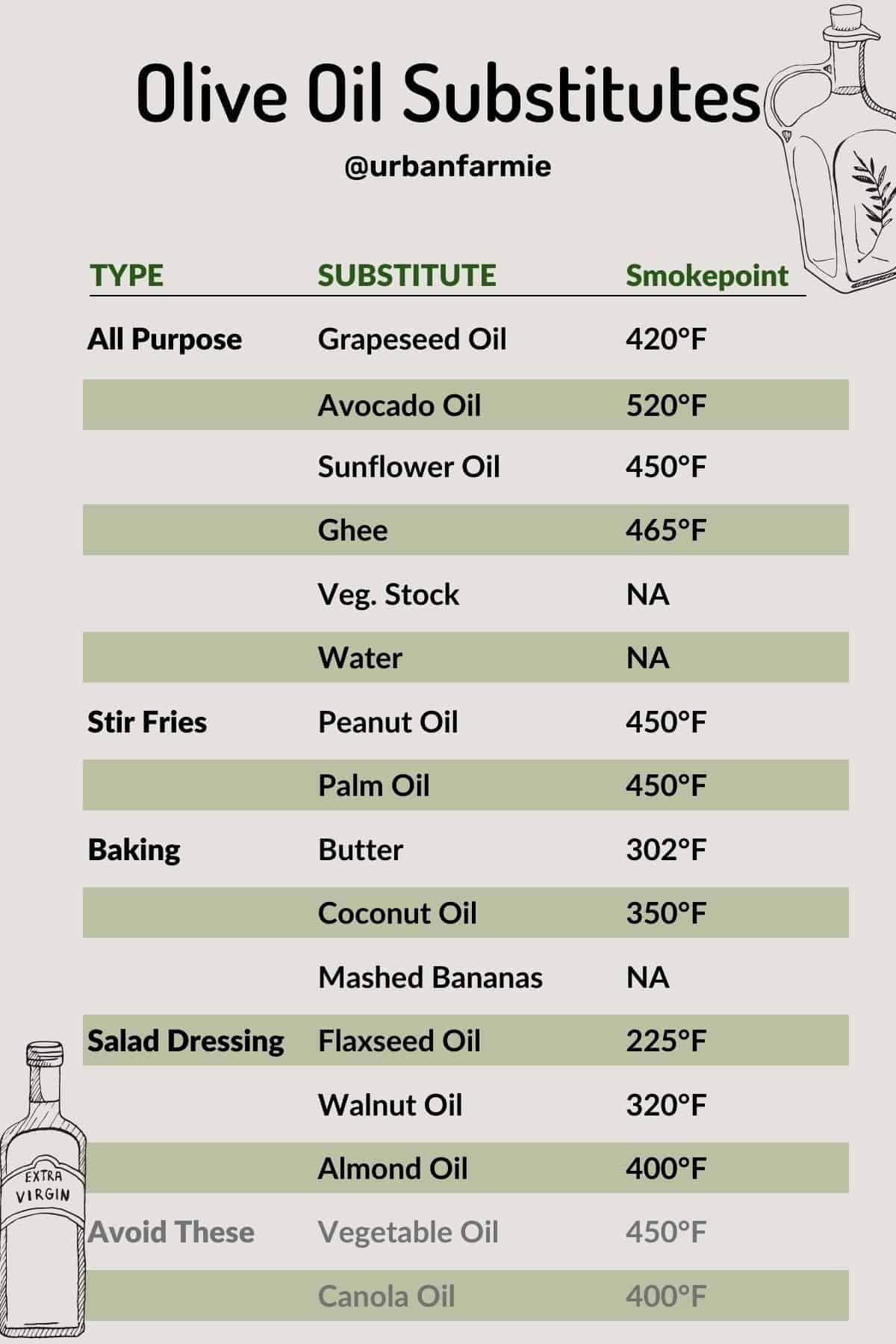
Best all-purpose substitutes
Have you ever been in the middle of cooking a dish when you realize that you're out of olive oil? While there are several substitutes that can be used in its place, some are healthier, while others add a different flavor to the food, which can be a nice change of pace! First, let's look at the best all purpose substitutes for olive oil and how to use them.
Grapeseed oil
Best all purpose substitute
Grapeseed oil is the perfect all-purpose substitute for olive oil. Grapeseed oil has been shown to lower blood pressure, reduce cholesterol, and offer other heart disease-fighting properties. It also has many of the same antioxidants as olive oil, but without that bitter taste, most people don't like it (especially if using the oil in baking).
But if you're cooking something where you want to taste the olive flavor (like bread dipped in olive oil), grapeseed won't work as a substitute.
Avocado oil
Great for general cooking, pan frying or baking
Avocado oil is an excellent substitute for olive oil, especially when cooking or baking. Avocado oil is a healthy oil and has a rich, sweet flavor that can add depth and complexity to your recipes and has a similar smoke point to olive oil (over 500 degrees F). Still, it is a relatively neutral oil and doesn't have the distinct taste that can sometimes be too overpowering in baked goods.
Sunflower oil
Great general cooking substitute
Out of all cooking oils, sunflower oil is a great substitute for olive oil in general cooking because it has a similar smoke point and contains heart-healthy fats. Sunflower oil contains many heart-healthy unsaturated fatty acids and is even a good source of vitamin E. But it can also be high in calories, so keep an eye on that if you're trying to lose weight. But, due to its high concentration of polyunsaturated fats, sunflower oil is not suitable for baking. Try using avocado oil or coconut oil instead.
Ghee
Great for pan frying or Indian cooking
Ghee is the best pan-frying cooking substitute for olive oil because it can withstand high temperatures without burning, resulting in not greasy, crispy food. Ghee has a strong flavor, so it's great if you're looking for extra flavor to impart (e.g., in an Indian curry) but if you're cooking a dish that needs a neutral taste, you might want to use a different oil for frying. I recommend picking ghee up at your local Indian grocery store (versus the options available at big supermarkets!)
Vegetable stock
Great for pan frying, sautéing, or general cooking for those who want to avoid oil altogether
If you are looking to avoid animal fats or any type of oil, then vegetable stock is your best choice. It has a higher smoking point, which prevents it from breaking down too quickly under high heat, but it's also less expensive and healthier than olive oil. You can use vegetable stock in place of olive oil in any recipe that specifies olive oil when pan frying or roasting vegetables.
Water
Great for pan frying, sautéing, or general cooking for those who want to avoid oil altogether
Water is the most affordable and accessible pan-frying and sauteing substitute for olive oil.
Oil can add some flavor to whatever you're cooking, while water can leave a dish tasting bland or not as delicious as it could be. Water can also steam food instead of frying it when used in excess. It's also not very good at preventing sticking. So if you don't want your food to stick, you will have to add more water than you would need if you were using oil.
Best for stir-fries
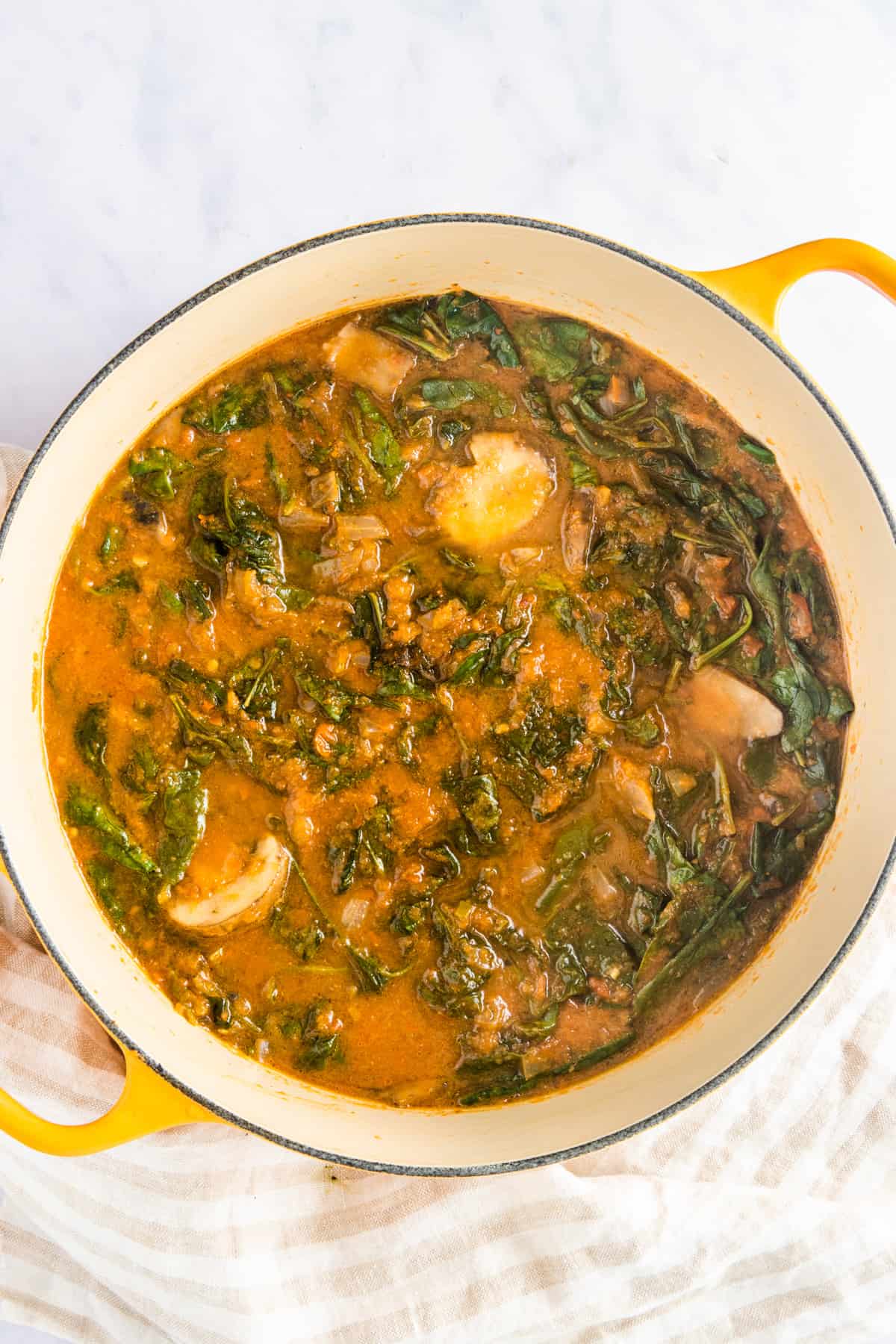
Peanut oil
Great for stir fries, Asian and West African cooking
Peanut oil has a high smoke point; it can withstand higher heat and is less likely to burn. But peanut oil also has a light, neutral taste, so it's great for Asian stir-fries and other dishes where you don't want the flavor of olive oil to dominate.
However, you might not want to use peanut oil if you have allergies or sensitivities to peanuts.
Palm oil
Great for stir fries, general cooking, Asian and West African cooking
Palm oil is similar to olive oil in its saturated fat content, but because of its neutral flavor, it stands out as an excellent substitute for olive oil in cooking Asian and African-influenced cuisine. You can pick this up at any local West African grocery store.
The downside to palm oil is that it isn't a great source of omega-3 fatty acids since it's high in saturated fat. If you're looking to eat healthily, you should use palm oil sparingly or choose a different oil.
💡 There are two types of palm oil, and not all of it is bad!
Crude palm oil comes from fleshy fruits pressed into a liquid form; palm kernel oil, via kernels crushed for use. You may have heard that palm oil has caused deforestation in Indonesia, and that's true!
But not all palm oil is bad: check out this informative breakdown to understand more about the issues with specific types of palm oil, and this op-ed by Yewande Komolafe, describing how indigenous palm oil (and it's use, especially in West African cuisine) doesn't contribute to the same issues.
Best for baking
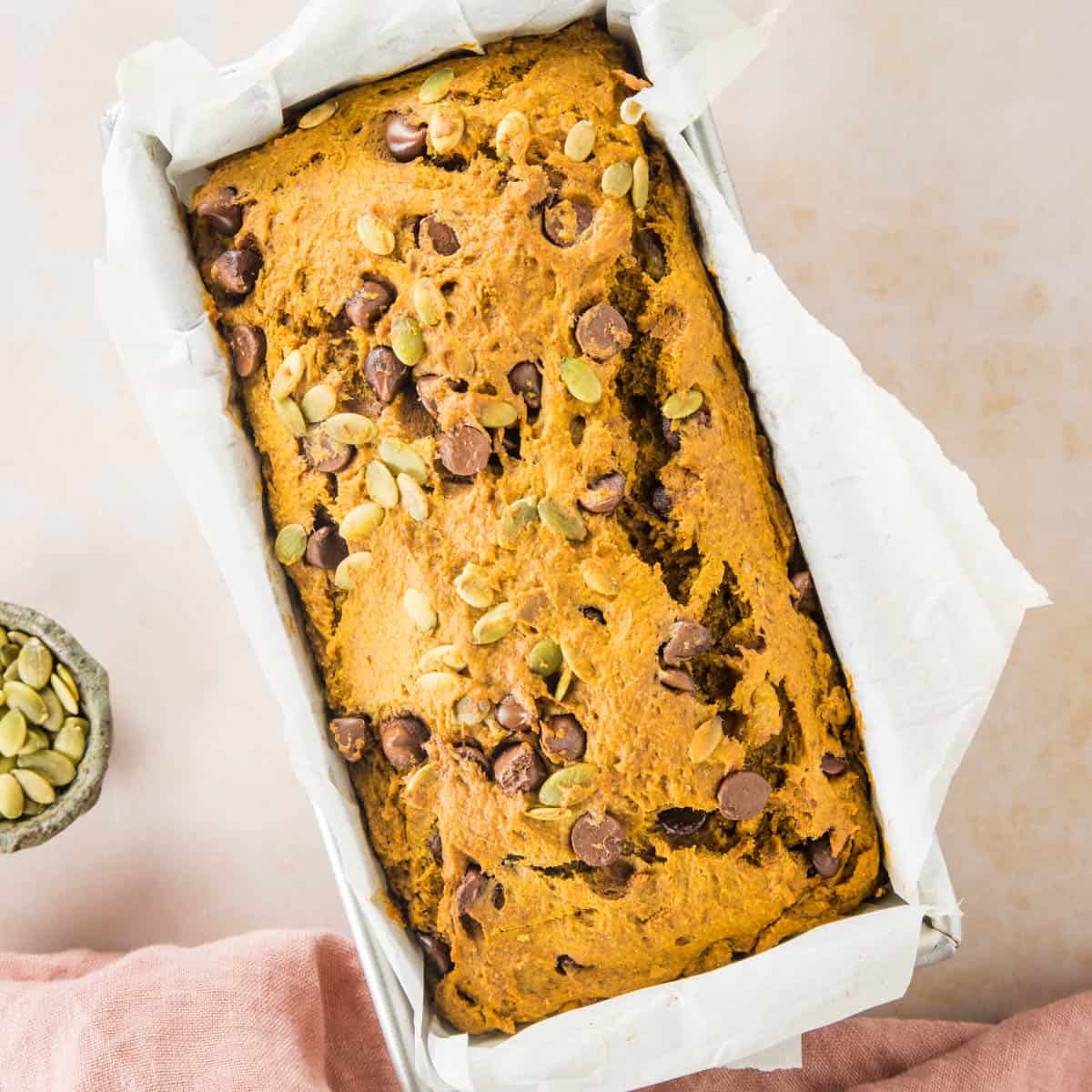
Butter
Great for baking, roasting, and pan frying
Butter is a great choice because it can stand up to high temperatures, so you don't have to worry about it breaking down and becoming toxic when you set your oven or stove burner too high. Butter is also gooey and rich and easy to apply to any surface, unlike olive oil, which pools or drips away from where you want it to be.
But if you're vegan, lactose-intolerant, or just watching your calories, it's best to use an alternative product to butter.
Coconut oil
Great for general cooking, pan frying, or Indian cooking
Coconut oil is an excellent substitute for olive oil in most, including cooking and baking.
Coconut oil's flavor is highly amenable to savory and sweet applications alike. Because of its strong flavor and distinct sweetness, it can be used as a substitute for other oils or fats in Indian cuisine.
Though coconut oil is considered a healthier alternative to olive oil, it's best to use it in moderation. If you use coconut oil, try using it as an optional substitute for butter in baking or a 1:1 replacement for olive oil when cooking foods with Asian, Mexican, or Caribbean influences.
Mashed bananas
Great for baking
Bananas are a simple substitute that is great for people who want to cut the fat without sacrificing their favorite recipes. They're not only high in potassium and vitamin B6, but they also have a creaminess that makes them perfect as a substitute for oil in baked goods.
You can use mashed bananas as a one-to-one substitute for olive oil in any baking recipe. Just mash up a banana with a fork or pulse it in a blender to get the consistency right, then measure it out like you would olive oil.
Best for salad dressings
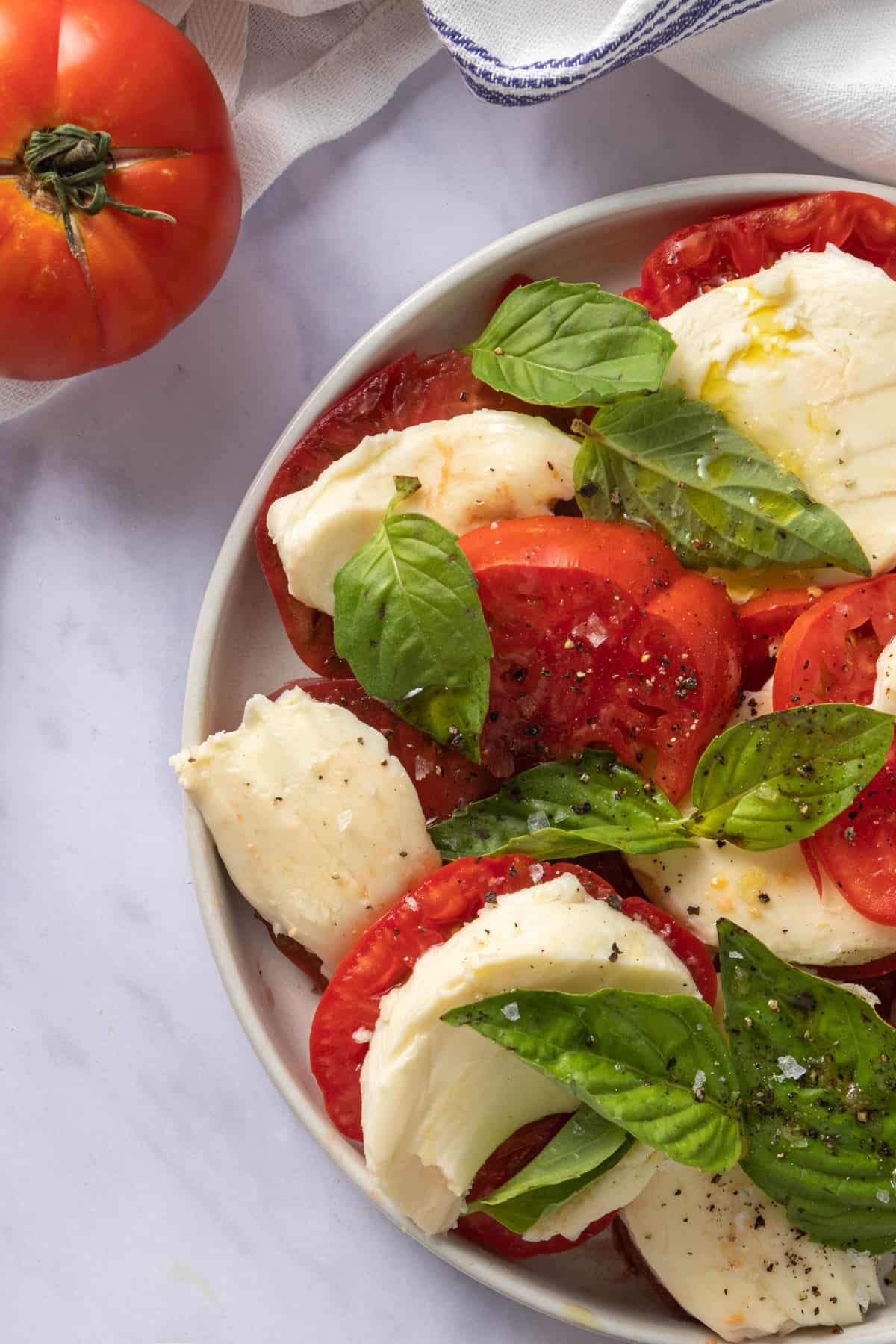
Flaxseed oil
Great for salad dressings
Many people are looking for ways to reduce their oil intake, and flaxseed oil is a great way to continue enjoying salad dressings without using olive oil. It has a similar taste to olive oil and is much lower in saturated fat. Flaxseed oil also contains omega-3 fatty acids, which have numerous health benefits.
However, flaxseed oil is more similar to sesame seed oil in that it's not very good at resisting high temperatures while cooking, so it's best used as a salad dressing or in other uncooked recipes.
Walnut oil
Great for salad dressing, bitter if heated.
Walnut oil adds a rich, nutty flavor to salads and other dishes, but it's not as strong as olive oil.
It is a little more expensive, but it's worth it for the taste. Walnut oil should never be heated—it'll lose some nutrients, become rancid, and turn bitter.
Almond oil
Great for salad dressing and baking
Almond oil has the same texture as olive oil and dresses salads nicely, but it's packed with more nutrients and is tastier. If you're looking to cut calories, almond oil is also lower in fat than olive oil. Just make sure to get cold-pressed unrefined almond oil if you want all the health benefits.
What you should not substitute for olive oil!
Vegetable oil
Vegetable oil has a higher smoke point than olive oil, making it perfect for frying, but olive oil is great for sautéing, salad dressings, sauces, or any other cooking method that doesn't require high heat.
Olive oil has a low smoke point compared to the vegetable oil, so if you substitute them in a recipe that calls for olive oil, you'll most likely burn your food. We recommend using grapeseed oil or sunflower oil as good vegetable oil substitutes.
Canola oil
Canola oil is a processed, chemically altered, and refined vegetable oil that has been shown to have adverse effects on the body, including inflammation and even DNA damage. On the other hand, Olive oil is a natural and beneficial ingredient that has been enjoyed for centuries without harmful side effects.
FAQs
Ideally, no. This is because of a few different reasons. Olive oil tends to have a higher smoke point than vegetable oils—which means it can reach a higher temperature before it starts to burn. Olive oil also has a more nuanced flavor than vegetable oils, which have a more neutral flavor profile.
Olive oil lasts between 18 and 24 months, while extra virgin olive oil lasts between 12 and 18 months. The time span depends on whether the olive oil is stored in a cool place away from light, which will prolong its shelf life. After this point, it begins to go rancid.
You may have heard that frying food in olive oil is good for you—but it's not ideal. Olive oil has a high smoke point, meaning that it's safe to use at higher temperatures than other oils. However, if heated past its smoke point, it can still produce free radicals. You can tell when the oil will start smoking and give off a burnt smell.










Oops! I just saw the section on avocado oil. Thank you for such a thorough article!
How do you feel about avocado oil? It tolerates heat better and has a very mild flavor, in my opinion. Is there anything bad about it?